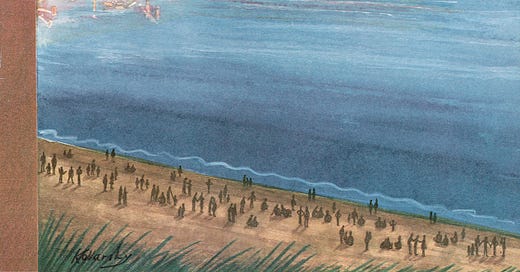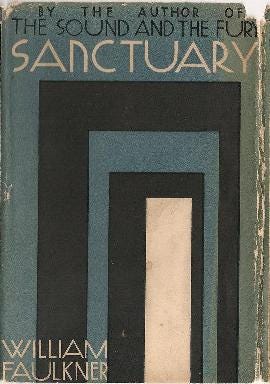Although he was a distant cousin on my Grandfather's side, my Grandmother always referred to William Faulkner as "That man."
She had a copy of "The Sound and The Fury," so I assume the problem wasn't Caddy Compson, although she was a problem with her soiled bloomers and all.
She referred to "Sanctuary" as "That book," so I assume Temple Drake was the problem. Drake was a problem for many people. Paul Hardin could never mention her without a devious look. Temple checked pretty much every box when it came to things girls from Mississippi shouldn't do. That it was made into a movie twice made the problem worse.
Except for the rape, Temple Drake reminded me of a lot of girls I knew, including one from Leeland, that I would have done pretty much anything for. There are a little over three generations between Faulkner and me, so I suppose that explains the difference in perspective. Things have changed an awful lot for women in Mississippi. Probably more than anybody else.
I always turned to Faulkner to understand Mississippi. Even though I was literally surrounded by famous Mississippians, I never felt like they were telling me everything. I studied Eudora Welty intently; I could tell when she was trying to tell the polite version of things and when she was telling the truth. Sometimes, I wish she were less polite. There were times when she showed her claws. That always impressed me.
Welty had a way of making a fool of people without them ever knowing it. I had just been born. My mother and I were still in the hospital when she wrote “Where is That Voice Coming From?” as an attack on whoever killed Medgar Evers. When asked if she was afraid that the men who killed Evers would be angry and seek revenge on her, Welty said, “Oh no, people like that don’t read the New Yorker.” She seems to have been right.
When Frank Hains was brutally murdered, Welty again took up her pen in anger. People in Jackson, including other writers at the Clarion Ledger, were saying terrible things about Frank, particularly about his sexuality, as if he deserved murder for being gay. Welty took control of Frank’s collum for an issue to tell a different story about Frank’s life. What were the editors going to do when Eudora Welty asked for column space? Say no? There was nothing remotely unpleasant in what she wrote, but to the people all over Mississippi who were making fun of Frank and how he died, she said, “You’re Wrong!” Coming from Eudora Welty, and her place in our society, that’s quite a rebuke.
I always thought that if I surrounded myself with these people and studied intently the things they wrote, then maybe some of it would rub off on me, and I could write something like that, but not as good. So far, that's never happened.
People keep telling me how good Kiese Laymon's "Heavy" is, and they're right. Kiese had a pretty rough go in life, and the people who were supposed to help care for him sometimes didn't. The last I heard, he was pretty sick in a life-threatening sort of way. What you deserve and what you get in life don't always match up.
I've been threatening to write about how Mississippi ended up being so poor, even though the good Lord blessed us in so many ways. One of my friends and classmates in the Else School of Management at Millsaps says it will be my least-read story. He might be right. Whenever I pick up the pen, I know that I've spent my nickle, and I takes my chances.
I’ve seen Mississippi defined by photographs, by paintings, some remarkable sculptures, and some fantastic songs. Elvis was born here, but he never sang about us. Bobbie Gentry did, though. Who needs Elvis?
I think words are the way to go. To understand the world, you have to understand a place like Mississippi. Most people think Faulkner said that, but it was Willie Morris who said it in a New York Times book review.
I used to see Morris, mostly in Jackson, mostly at George Street, and Hal and Mals. He was usually drunk. So was I. He was famous for it. I was just loud. I always felt like Morris would never be recognized for how brilliant he was because he never found that one story that blew people away. I have the same problem. Every writer does.
To understand the world, you have to understand a place like Mississippi. I don’t understand Mississippi, even though I’ve spent my life trying. I never felt like I was a part of it. I felt myself outside of Mississippi, looking in, a stranger in a strange land, even though I was born here and had the privilege to meet and know so many of the people often held up as to how to define Mississippi.
Temple Drake was a tragic character. My grandmother was right to be embarrassed by her, although I was more embarrassed by Caddy Compson, and I understood Quinton Compson innately. A lot of people think I’m more like Benjy Compson, especially when I write about politics.
Tomorrow, and tomorrow, and tomorrow,
Creeps in this petty pace from day to day,
To the last syllable of recorded time;
And all our yesterdays have lighted fools
The way to dusty death. Out, out, brief candle!
Life's but a walking shadow, a poor player,
That struts and frets his hour upon the stage,
And then is heard no more. It is a tale
Told by an idiot, full of sound and fury,
Signifying nothing.





